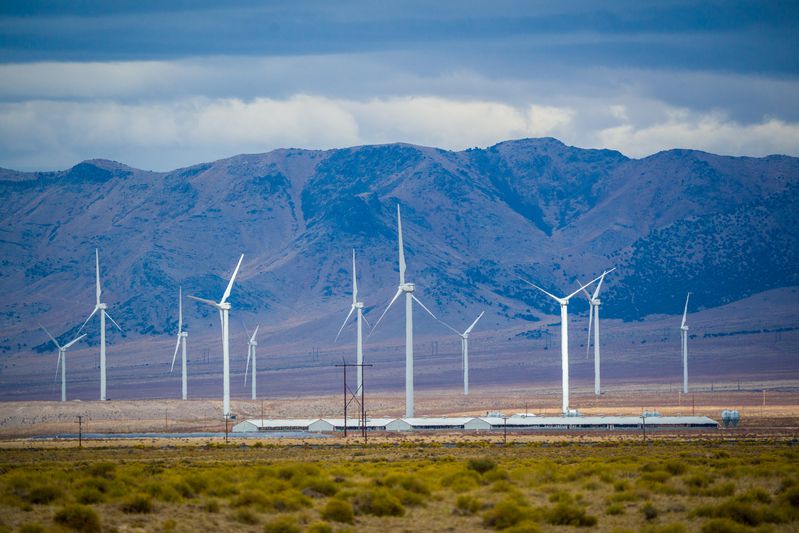Should the sun set on solar and wind tax credits?
Tim Fitzpatrick
This story is part of The Salt Lake Tribune’s ongoing commitment to identify solutions to Utah’s biggest challenges through the work of the Innovation Lab.
Comprehensive legislation that would give more scrutiny to Utah’s tax credits brought blowback from a wide range of Utahns who say it will chill progress toward converting to clean energy and building out new industry.
Called “Incentive Amendments,” HB407 addresses tax breaks for renewable energy, historic preservation, research and development, recycling and motion picture production. In most cases, the bill doesn’t end the breaks, but it does require a higher level of reporting and justification for them.
“Some of these credits are probably doing great things, and some we don’t know because we don’t have enough information on them,” said the bill’s sponsor, Rep. Kay Christofferson, R-Lehi.
The bill would require state agencies to issue certificates to qualifying companies, and the credits would be listed on the agency’s website.
Critics ranged from a Beaver County Commissioner who fought to preserve tax breaks for solar and wind farms in his county to a biotech lobbyist who fears more bureaucracy will discourage growth in Utah’s life sciences industry.
The strongest opposition came over the Renewable Energy Systems Tax Credit. In that case, Kristofferson’s bill would end the tax breaks in 2034.
“I just think 10 years plus what they’ve had in the past should be enough,” Christofferson told the House Revenue and Taxation Committee earlier this week.
“I’ve been working on projects for more than 10 years, and they’re not built yet,” countered Bryan Harris, director of development at Longroad Energy, which has built two wind farms and one solar farm in Beaver County.
He said the projects have already paid $37 million in property taxes over their first 13 years, and they will pay $75 million over 30 years. The tax credits will be $21 million over that period, so the investment is more than covered in property taxes alone. Revenue from employment taxes and other growth in Beaver County’s economy is on top of that, Harris said.
“These are projects that have brought 40 jobs. I see 40 families,” said Beaver County Commissioner Brandon Yardley. “The production tax credit has helped families in Beaver.”
Lincoln Shurtz, lobbyist for the Utah Association of Counties, said his group supports more reporting and accountability around the tax credits. “However, we do oppose the wind and solar credits going away.”
Shurtz pointed out that there is competition with other states for renewable energy facilities. As it is now, Utah imports a lot of wind energy from Wyoming. Without the tax breaks, more projects will go elsewhere, he said.
Regarding the tax credits for companies’ research costs, Christofferson said they totaled $125 million in 2020. “We really don’t know how they’re being used,” he said, but added, “For the most part, I think they’re being used well.”
Industry representatives pushed back on the increased reporting requirements of the bill, saying it will drive investment elsewhere.
Chris Blake of BioUtah, a trade association of Utah life sciences companies, noted that the credits are “post-performance,” meaning they can’t be claimed until the companies have demonstrated economic gain from the research activities. That makes the risk low.
“They’ll go elsewhere,” said Greg Free of Merit Medical Systems, which he said was “Utah’s largest homegrown medical device manufacturer.”
Rusty Cannon, president of the Utah Taxpayers Association, agreed. “It’s the chilling effect. Will this disadvantage Utah?”
The bill also makes small changes to credits for historic preservation, motion picture production and recycling equipment. No one testified for or against those changes at the committee hearing.
HB407 passed out of committee, but barely. The vote was 5 to 4, with four committee members absent. It was sent to the House floor and still must pass the Senate and be signed by the governor to become law.
Tim Fitzpatrick is The Salt Lake Tribune’s renewable energy reporter, a position funded by a grant from Rocky Mountain Power. The Tribune retains all control over editorial decisions independent of Rocky Mountain Power.

en
2023-02-18T13:00:45.2240000Z
2023-02-18T13:00:45.2240000Z
https://www.sltrib.com/renewable-energy/2023/02/18/should-sun-set-solar-wind-tax/